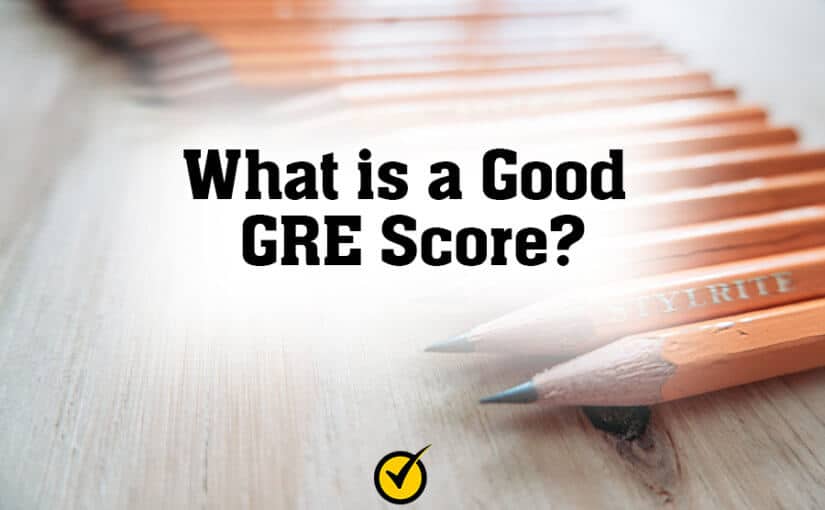– More than 1,200 business graduate schools accept the GRE.
– Over 700,000 individuals take the GRE each year.
– The GRE is the most common entrance exam for post-baccalaureate students.
When you’re preparing for an exam, you probably want to know what a good score is for that exam. With many exams, having that “good” score really does matter and with other exams, having a “good” score really depends on what you’re trying to accomplish with that score.
This goes for the GRE. A “good” score on the GRE depends on what you’re trying to accomplish and what graduate programs you’re considering. Different graduate programs have their own definition of a “good” GRE score.
Free GRE Exam Prep Course
Free GRE Practice Test
Learning what is a “good” GRE score can help you when you’re planning out your study time and helps you to understand how far you need to go with your studying.
But before we dig into what a good score is for the GRE, let’s find out what the GRE exactly is.
GRE Test Prep
GRE Online Course
What is the GRE?
The GRE is a standardized exam that is required for many graduate schools in the nation. The GRE is used by those who are interested in perusing a degree higher than a bachelor’s degree and is used to measure overall academic readiness for graduate school.
What is tested on the GRE?

There are three areas tested on the GRE:
Analytical Writing
Verbal Reasoning
Quantitative Reasoning
Analytical Writing
The Analytical Writing section is always the first section that you’ll take on the exam. This section will measure how well you are able to articulate and support complex ideas, examine claims and accompanying evidence, as well as appropriately utilize the elements of standards written English.
You’ll be given two essays to complete; each are timed for 30 minutes. One essay is “Analyze an Issue” and the other is “Analyze an Argument”.
The “Analyze an Issue” task requires you to present an argument based on a given topic. You’ll be required to write a 4 to 6 paragraph essay based on this topic. This measures your ability to think critically about a topic of interest and to express your thoughts about this topic in writing.
The “Analyze an Argument” task will measure your ability to understand, analyze, and evaluate arguments that are to specific instructions and how well you are able to convey your evaluation in your writing. You’ll be given an argument and will be asked to evaluate the logical soundness of the argument of another writer.
GRE Analytical Writing Study Guide
Verbal Reasoning

The Verbal Reasoning section contains two sub-sections; each that contain 20 questions to be completed in 30 minutes. This section measures your understanding of reading, the application of reasoning skills, and how well you analyze and evaluate written material. You’ll also be tested on a range of vocabulary.
The Verbal Reasoning section contains three types of questions, Reading Comprehension, Text Completion, and Sentence Equivalence.
The Reading Comprehension questions test your abilities that are required to read and understand the types of prose that you’ll encounter during graduate school such as understanding the meaning of individual words and sentences and summarizing a passage. You’ll be given 10 questions that are based on 5 passages.
The Text Completion questions test your verbal reasoning and comprehension. You’ll be required to analyze and evaluate written material and recognize relationships between words and concepts. You will be given 6 Text Completion questions that require you to fill in the blanks to complete the sentence with a range of words that are provided.
The Sentence Equivalence questions test your ability to reach a conclusion about how a passage should be completed with the partial information that is given. You’ll be given a sentence containing one blank and you’ll need to find the two choices that lead to a complete sentence while producing sentences that mean the same thing.
GRE Verbal Reasoning Practice Test | GRE Verbal Reasoning Study Guide
Quantitative Reasoning
The Quantitative Reasoning section of the GRE measures your basic mathematical skills and your understanding of elementary mathematical concepts. It also measures your ability to reason quantitatively and to model and solve problems with quantitative methods. This section covers basic concepts that are typical for a college student to know. You’ll be given a total of 40 questions divided into two sub-sections. The topics that you’ll be tested over include:
- Arithmetic
- Algebra
- Geometry
- Data Analysis
GRE Quantitative Reasoning Practice Test | Quantitative Reasoning Study Guide
How is the GRE Scored?
The GRE is scored a little different than other exams. Each section on the exam is scored on its own. This means you’ll receive three different scores.
The Analytical Writing section is scored on a scale of 0-6, in half-point increments.
The Verbal Reasoning section is scored on a scale of 130-170 in 1-point increments.
The Quantitative Reasoning section is scored on a scale of 130-170 in 1-point increments.
The scores you receive on the Verbal Reasoning and Quantitative Reasoning sections are based on the number of questions that you answered correctly. This number will give you a raw score which is then converted into your scaled score. The scaled score is on a range between 130 to 170, making 130 the lowest score possible.

The Analytical Writing section is scored more on a straight forward basis. You will receive a score ranging between 0 to 6, 6 being the highest score possible on this section.
What is a Good GRE Score?
A good GRE score depends on the graduate program you want to attend and the school you want to attend. However, when you’re considering the range of scores, a good score will put you at 50% ahead of the other test-takers, but you won’t have quite the advantage if you apply to a highly competitive graduate school.
Good scores for the GRE include:
Verbal Reasoning: 152-158
Quantitative Reasoning: 153-158
Analytical Writing: 4

